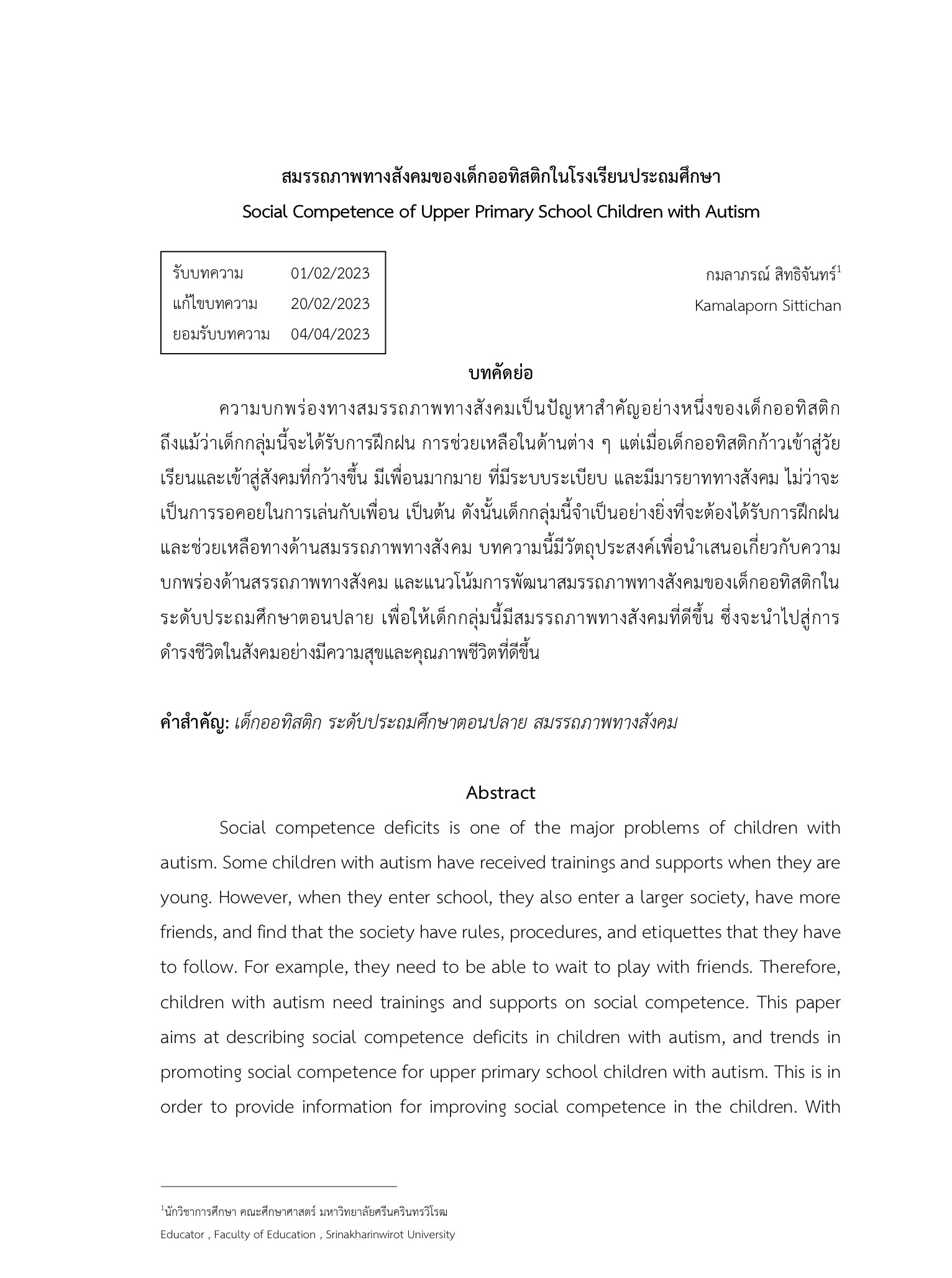Social Competence of Upper Primary School Children with Autism
Keywords:
Autistic children, elementary school, social competenceAbstract
Social competence deficits is one of the major problems of children with autism. Some children with autism have received trainings and supports when they are young. However, when they enter school, they also enter a larger society, have more friends, and find that the society have rules, procedures, and etiquettes that they have to follow. For example, they need to be able to wait to play with friends. Therefore, children with autism need trainings and supports on social competence. This paper aims at describing social competence deficits in children with autism, and trends in promoting social competence for upper primary school children with autism. This is in order to provide information for improving social competence in the children. With improved social competence, children with autism are likely to live more happily in the society and have better qualities of lives.
References
ดารณี อุทัยรัตนกิจ. (2561). เปิดโลกความรู้เด็กออกทิสติกในสังคมไทย ผ่านสายตาของ รศ.ดร.ดารณี อุทัยรัตนกิจ. ค้นเมื่อ พฤศจิกายน 25, 2565,
จาก https://www.the101.world/daranee-interview/
นาถลดา ตะวันกาญจนโชติ. (2559). ทักษะทางสังคมของเด็กออทิสติกวัยเรียน. วารสารการพยาบาลจิตเวชและสุขภาพจิต, 30 (2), 1-21.
ทวีศักดิ์ สิริรัตน์เรขา. (2565). ออทิสติก. ค้นเมื่อ พฤศจิกายน 22, 2565, จาก https://www.happyhomeclinic.com/au21-autism-faq.html
ผดุง อารยะวิญญู. (2546). วิธีการสอนเด็กออทิสติก. กรุงเทพฯ: มหาวิทยาลัยศรีนครินทรวิโรฒ.
สถาพร อิ่มเอม (2562). โปรแกรมการพัฒนาสมรรถภาพทางสังคมเด็กและเยาวชนโดยใช้ฐานแนวคิดการบำบัดโดยการแสดงออก (expressive therapy): กรณีศึกษาสภาเด็กและเยาวชนจังหวัดสุรินทร์. กรุงเทพฯ: มหาวิทยาลัยธรรมศาสตร์.
Abstract, F. K., Moon, J. & Sokolik, Z. (2022): Virtual reality–based social skills training for children with autism spectrum disorder. Journal of Special Education Technology, 37 (1), 49 –62
Cooper, D. H. & Farran, D. C. (1988). Behavioral risk factors in kindergarten. Early Childhood Research Quarterly, 3 (1), 1-19.
Finne, J. N. & Svartdal, F. (2017, November). Social perception training: improving social competence by reducing cognitive distortions. Special Issue, 9 (2), 44-45.
Gedviliene, A. et al. (2014). The social competence concept development in Higher education. European Scientific Journal October, 10 (28), 2014. 36-49.
Greenberg, M. et al. (2017). Social and emotional learning as a public health approach to education. The Future of Children, 27 (1), 13-32.
Hukkelberg, S. et al. (2019). The relation between behavioral problems and social competence: A correlational Meta-analysis. n.p.
Legkauskas, V. & Magelinskaite-Legkauskiene, S. (2019). Importance of social competence at the start of elementary school for adjustment indicators a year late. Issues in Educational Research, 29 (4), 201.
Kuriakose, S. et al. (2013). A Step towards virtual reality based Social communication for children with autism. Retrieved December, 15, 2565, form https://www.researchgate.net/publication/271556222_A_step_towards_ virtual_reality_based_social_communication_for_children_with_Autism.
Lillvist, A. et al. (2009). The construct of social competence - how preschool teachers define social competence in young children. International Journal of Early Childhood, 41 (1), 51-68. https://doi.org/10.1007/BF03168485
Lim, S. M., Rodger, S. & Brown, T. (2013). Model of social competence in an early childhood environment. Occupational Therapy in Mental Health, 29 (2), 114-133. https://doi.org/10.1080/0164212X.2013.78897-5
Manikiza, J. (2015). Autism: A guide for mainstream primary schools. http://www.ASDinfoWales.co.uk
McClelland, M. M., Acock, A. C. & Morrison, F. J. (2006). The impact of kindergarten learning-related skills on trajectories at the end of elementary school. Early Childhood Research Quarterly, 21 (4), 471-490. https://doi.org/10.1016/ j.ecresq.2006.09
Ngar, S., Yuan, V. & Shine Ip, H. H. (2018) Using virtual reality to train emotional and social skills in children with autism spectrum disorder. London Journal of Primary Care. 10 (3), 110–112
Senapaty, H. (2019). Including children with autism in primary classrooms: National council of educational research and training. n.p.

Downloads
Published
How to Cite
Issue
Section
License
Copyright (c) 2024 ournal of Humanities and Social Sciences Nakhon Pathom Rajabhat University

This work is licensed under a Creative Commons Attribution-NonCommercial-NoDerivatives 4.0 International License.
Journal of Humanities and Social Sciences Nakhon Pathom Rajabhat University





